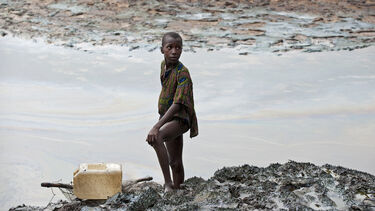How does Marxist dependency theory help rethink the contemporary issue of environmental degradation?
MSc Environmental Change and International Development student, Cadi Panton, explores how Marxist dependency theory helps rethink the contemporary issue of environmental degradation?

(Amin, 2009, p. 21).
This blog employs a Marxist dependency framework as a useful , analysing the phenomenon of environmental degradation through the case study of oil spills in the Niger Delta region. Environmental degradation denotes ecological damage driven by anthropogenic and/or natural causes impacting both natural and human systems with environmental, economic, political and social consequences. Critically, recognising the drivers of environmental degradation is at once political and place-based, often conceptualised as an inevitability of capitalism. Through the application of Marxist dependency theory this blog considers the case study of oil spills in the Niger delta to show (1) how an over-dependence on oil exports in Nigeria facilitates the heightened risk of environmental degradation established through neo-colonial trade relations and (2) how the persistent and ongoing nature of the spills is sustained through a system of ecologically unequal exchange.
- Outlining Marxist Dependency Theory
Dependency theory emerged as a reaction to the perceived failures of modernisation theoryŌĆÖs capacity to explain the state of persistent underdevelopment in Latin America. Subsequently, the Marxist sub-division analysed the ŌĆśdependencyŌĆÖ of Latin America as a fundamental condition of global capitalism, centrally arguing that Dos Santos defined dependence as .
Due to the changing face of global capitalism ŌĆō principally the move from and rising climate change pressures ŌĆō the continued relevance of MDT is debated. argues that due to power shifts from states to markets, states can no longer enact economic policy against (any) owners of capital, rendering MDT imprecise in its analysis of neo-colonial core economies. Markedly, Hackett argues that through a reflexive understanding of these shifting economic conditions the theory remains useful, that by ŌĆØ. Samir Amin, for example, is often credited for his nuanced analysis of ŌĆ£polarising tendencies of globalisationŌĆØ creating relations of dependency in and between states and populations (Kufakurinani, 2017).
- Conditions of Dependence, Conditions of Degradation
An application of MDT uncovers the historical conditions that facilitated a dependence on oil extraction from the Niger Delta and the accompanying ecological risks. Oil was first discovered in 1956 in the Oloibiri region, and between 1956-76, oil revenues subsequently grew from substantiating . At a high ecological cost,
across the Delta region, onsetting multiple socio-economic and ecological damages. The region's life expectancy is 10 years lower than the national average.
Emerging as a newly independent state from British colonial rule in the 1960s conditioned Nigeria to natural resources. MDT posits that emergent economies did not enter equally into the market, , obfuscated by the illusion of 'free trade'. In praxis, by the 1970s the region's oil was largely under the ownership of the 'Shell Petroleum Development (Nigeria) Company Ltd, a coalition between the Nigerian National Petroleum Company (NNPC) and Shell Internation, Elf and Agip. Critically, ŌĆścoreŌĆÖ interests were sustained through their presence in ŌĆśperipheryŌĆÖ exports, highlighting how .
- Ecologically Unequal Exchange
Accounting for 75% of government income, . Critically, while liberal economics naturalises market ŌĆśfluctuationsŌĆÖ (also perceiving NigeriaŌĆÖs significant GDP growth following oil discovery as a 'development success') explains the state's fragile economy, high inequality, growing poverty, and low socio-economic investment as a continued state of dependency. In particular, this conditional access to artificial development exacerbates the exploitation of natural resources (oil) to sustain national income. It is within this precarious context that the concept of ŌĆ£ecologically unequal exchangeŌĆØ highlights the obfuscation of socio-ecological costs within the global economy whereby environmental degradation is ŌĆ£offshored to countries in the peripheryŌĆØ (Ciplet et al., 2022).
Markedly, in 2019, due to ongoing local activism, . While MDT faces critique for neglecting the role of agency in international politics, in the case of Nigeria, the theory of ecologically unequal exchange could be adopted to explore the relationship between oil corporations and local activists. Ultimately, international oil pricing fails to account for the environmental damage shouldered by communities in the Niger Delta region facilitating the continued issue of environmental degradation in the form of oil spills. This operates to sustain an ecologically damaging industry, disincentivising environmental regulations.
- Conclusion
While scholars debate the continued relevance of MDT in a shifting global economy, this blog critically demonstrated how the theory continues to provide useful insights into environmental degradation, specifically the relationship between capitalism and the environment through the case study of oil spills in the Niger Delta. First, the blog outlined MDT providing a theoretical basis for analysis. Second, the blog evaluated Nigeria's neo-colonial conditions of dependence and subsequent heightened risk of oil spills. Lastly, the blog analysed the how the oil spills have been sustained through a system of ŌĆśecologically unequal exchangeŌĆÖ.
Author: Cadi Panton - MSc Environmental Change and International Development
Bibliography
Amin, S. (2009) ŌĆśCapitalism and the Ecological FootprintŌĆÖ, Monthly Review, 61(6), p. 19. Available at: https://doi.org/10.14452/MR-061-06-2009-10_2.
Ciplet, D. et al. (2022) ŌĆśThe unequal geographies of climate finance: Climate injustice and dependency in the world systemŌĆÖ, Political Geography, 99, p. 102769. Available at: https://doi.org/10.1016/j.polgeo.2022.102769.
Leys, C. (1980) ŌĆśChallenging Development ConceptsŌĆÖ, The IDS Bulletin, 11(3), pp. 21ŌĆō24. Available at:.
Kufakurinani, U. et al. (2017) Dialogues on Development Volume 1: Dependency. New York: Institute for New Economic Thinking.
